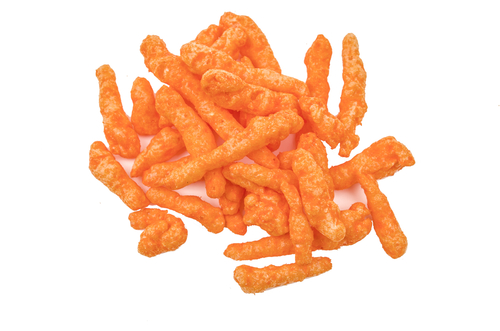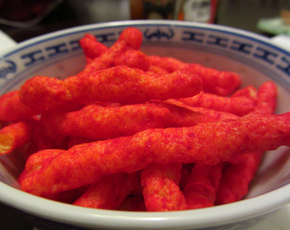Short answer
Cheetos are bad for you. They have no nutritional value and are full of synthetic and highly-processed ingredients.
Recommended Alternative
Category 'F' is for things that fail to bring anything beneficial to the table, and are very harmful to your health. We recommend completely avoiding anything in this category. Long-term side effects of 'F' items are usually very serious.
View Full Grading System
Category 'A'
Very healthy and numerous health benefits. Side effects are rare. Things rated an 'A+' are typically necessary for survival (for example, water).
Very healthy and numerous health benefits. A few harmful qualities may be associated, but only under certain circumstances such as an allergic reaction.
Very healthy and numerous health benefits. Harmful qualities may be associated, but aren't usually serious.
It is important to note that even the best things in life can become bad in immoderate amounts. So, although something may be rated an 'A+', overconsumption/overdoing can bring unwanted effects.
Category 'B'
Very beneficial to your health. Things rated a 'B+' may have a few harmful qualities to pay attention to.
Overall beneficial to your health. Things rated a 'B' may have some harmful qualities to pay attention to.
More beneficial to your health than not. However, harmful qualities are most likely associated and shouldn't be overlooked.
The main difference between category 'A' and category 'B' is the harmful qualities typically present in 'B' items. Serious side effects are usually uncommon, but are still possible and should be taken note of.
Category 'C'
Both beneficial and harmful qualities associated. Things rated a 'C+' are typically a bit more on the beneficial side. Still, moderation is important.
A fairly even ratio of beneficial and harmful qualities. Moderation is important. Very general topics that can lean towards both sides of the spectrum will be placed here as well. Rice, for example, can be good or bad depending on the type.
More harmful than beneficial. Side effects are common, especially when consumed/done excessively. Moderation is very important.
Category 'C' usually denotes to both good and bad qualities. When it comes to this category, it is important to keep this word in mind: moderation.
Category 'D'
Harmful to your health. Although benefits may be associated, the bad most likely outweighs the good. Moderation is very important.
Harmful to your health. A few benefits may be associated, but the bad outweighs the good. Moderation is extremely important.
Harmful to your health. Very few, if any, benefits are present. Things in this category should be avoided as much as possible.
Category 'D' is typically for things that are more harmful than beneficial. While consuming/doing something unhealthy once in a blue moon shouldn't hurt, we definitely recommend eliminating 'D' items as a regular part of your routine/diet.
Category 'F'
Category 'F' is for things that fail to bring anything beneficial to the table, and are very harmful to your health. We recommend completely avoiding anything in this category. Long-term side effects of 'F' items are usually very serious.
Category 'N'
'N' stands for neutral. Things placed into this category are generally (a) neither good nor bad for you, or (b) lack the necessary evidence to reach any conclusions.
Long answer
Cheetos are crunchy, cheese-flavored, puffed corn products containing basically no real ingredients and no nutritional value. A serving of Cheetos (about 21 individual pieces) has 150 calories and 10 grams of fat, but essentially no positive nutritional value. Furthermore, Cheetos are highly processed and have artificial colors and flavors added.
The first ingredient in Cheetos is "enriched corn meal". "Enriched" can mean the cornmeal has Ferrous Sulfate, Niacin, Riboflavin, and Folic Acid added, among other things. Ferrous Sulfate is used to treat anemia and other iron deficiencies, but is usually prescribed by a doctor. Niacin and Riboflavin again are not particularly dangerous, but certainly don't occur naturally in corn and corn products. Maltodextrin is another questionable Cheeto ingredient. Even though maltodextrin does not have to be labeled as sugar, it has a glycemic index twice that of refined cane sugar and is treated by the body in the same way. This means even though Cheetos contain 0 grams of sugar per serving, they are broken down by the body as a complex carbohydrate. Cheetos also contain yellow 6, an artificial color, which can cause hyperactivity in children and allergic reactions in some adults. Animal studies have even shown the coloring to caused adrenal tumors in animals.
Despite this, the high fat and sodium content are still the most troubling aspects of Cheetos. In one serving, there are 250 mg of sodium and 10 grams of fat. This is about 10% of the sodium an adult should consume in a day, and over 15% of the total fat. If you consider a large bag (or even a large handful) of Cheetos, these amounts increase drastically. As with most snack foods, the true danger lies in over-indulging. High fat, processed, foods like Cheetos contribute to a less-than-healthy lifestyle, and including them in your diet will raise your risk for heart disease, high blood pressure, high cholesterol, and certain cancers. Cheetos might have the fake-cheese taste you crave, but they are an unhealthy and unnatural snack.
Possible short-term side effects
- bloating
- nausea
- sluggishness
-
hyperactivity (especially in children)
Possible long-term side effects
- heart disease
-
obesity
-
various forms of cancer
-
high blood pressure
Ingredients to be aware of
Healthier alternatives
- natural corn chips w/ cheddar cheese
Team-Picked Alternative
(what is this?)
Hippeas Chickpea Puffs
- 3g plant protein
- 2g dietary fiber
- Vegan snack
- Gluten-free
- Crunchy & flavorful
Learn More!
Please turn your Ad Blocker off to see this content. Thank you!
Thank you for your feedback!
Written by Leah Bolton
Published on: 02-09-2016
Last updated: 11-30-2023
Thank you for your feedback!
Written by Leah Bolton
Published on: 02-09-2016
Last updated: 11-30-2023

 Approved by
Approved by 















